 Petzlover
Petzlover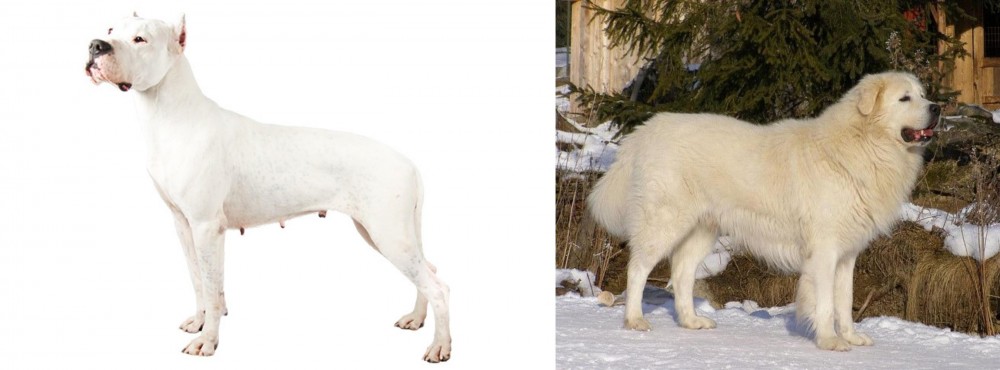 Argentine Dogo is originated from Argentina but Slovak Cuvac is originated from Slovakia. Both Argentine Dogo and Slovak Cuvac are having almost same height. Both Argentine Dogo and Slovak Cuvac are having almost same weight. Both Argentine Dogo and Slovak Cuvac has almost same life span. Both Argentine Dogo and Slovak Cuvac has same litter size. Argentine Dogo requires Low Maintenance. But Slovak Cuvac requires Moderate Maintenance
Argentine Dogo is originated from Argentina but Slovak Cuvac is originated from Slovakia. Both Argentine Dogo and Slovak Cuvac are having almost same height. Both Argentine Dogo and Slovak Cuvac are having almost same weight. Both Argentine Dogo and Slovak Cuvac has almost same life span. Both Argentine Dogo and Slovak Cuvac has same litter size. Argentine Dogo requires Low Maintenance. But Slovak Cuvac requires Moderate Maintenance
 Known also as the Argentinian Mastiff, this large dog breed from Argentina is a descendant of the extinct Fighting Dog of Cordoba. People were looking for a fearless, companionable dog, and a man, Martinez from Argentina, began a selective breeding program to get a breed that wasn’t essentially geared to fighting.
Known also as the Argentinian Mastiff, this large dog breed from Argentina is a descendant of the extinct Fighting Dog of Cordoba. People were looking for a fearless, companionable dog, and a man, Martinez from Argentina, began a selective breeding program to get a breed that wasn’t essentially geared to fighting.
A number of breeds were mixed to achieve the desired characteristics in the Argentine Dogo breed.
It is unfortunate that the dog has been used for fighting and that it comes across as a dangerous dog so that today it is banned in several countries.
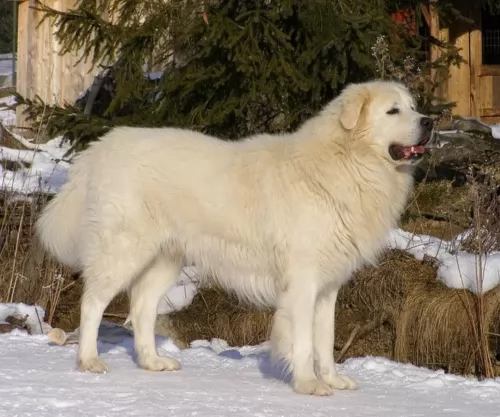 Looking quite a bit like the Pyrenean Mountain Dog, the Slovak Cuvac is a large dog that has served as a guard dog. The Slovensky Cuvac is still used on sheep farms as he isn’t afraid of wolves and bears and will take them on if needs be.
Looking quite a bit like the Pyrenean Mountain Dog, the Slovak Cuvac is a large dog that has served as a guard dog. The Slovensky Cuvac is still used on sheep farms as he isn’t afraid of wolves and bears and will take them on if needs be.
Records of this dog have been kept since the 17th century already, and when the breed started dying out, a certain Dr Antonin Hruza put in efforts to revive the dog.
The registered breeding of the Slovensky Cuvac was established in Czechoslovakia and a club for the dog was established in 1933. A written standard was established in 1964. The dog is not recognized by the Fédération Cynologique Internationale.
 The Argentine Dogo is a striking looking dog, large, muscular and powerful looking. He stands at about 60 – 68cm and weighs about 35 – 45kg.
The Argentine Dogo is a striking looking dog, large, muscular and powerful looking. He stands at about 60 – 68cm and weighs about 35 – 45kg.
He has a pure white coat. The coat is short and smooth. The ears are high set and most times cropped and erect.The Dogo’s tail is long and hangs naturally.
The Argentine Dogo is a companion dog today who can be loving and loyal towards his human family. He is a strong willed dog with a distrust of strangers and other animals.
He will most certainly require training and socialization if you want him to behave well among people and animals. With proper training and socialization, he can make a good family pet.
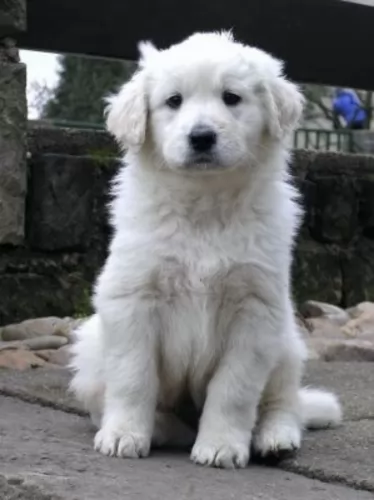 This is a large dog standing at between 59 and 70cm in height and weighing between 31 and 44kg.
This is a large dog standing at between 59 and 70cm in height and weighing between 31 and 44kg.
The neck is broad and has quite a bit of fur around it. The head is large, the eyes dark brown, the double coat is white and thick and medium length. The eyes are brown, the ears medium length and floppy and the tail long and furry.
This is a robust dog, used to spending time outdoors keeping watch over livestock. When he is invited into the home, he is gentle and well behaved, more so when he has been trained and socialized.
He is loving and loyal towards his human family and will get on well with children in the home. He isn’t the brightest dog but you can still have him trained.
 This big, muscular white dog with his short white coat was once a hunting dog so he is active and energetic. He is also intelligent and courageous, loving his human family and wanting to protect them being a strong characteristic of his.
This big, muscular white dog with his short white coat was once a hunting dog so he is active and energetic. He is also intelligent and courageous, loving his human family and wanting to protect them being a strong characteristic of his.
The Argentine Dogo is social, strong, loyal and devoted and just wants to be part of his human family and all their activities. It is important that he is trained and socialized at an early age because then he is obedient and relaxed around people and pets in the home.
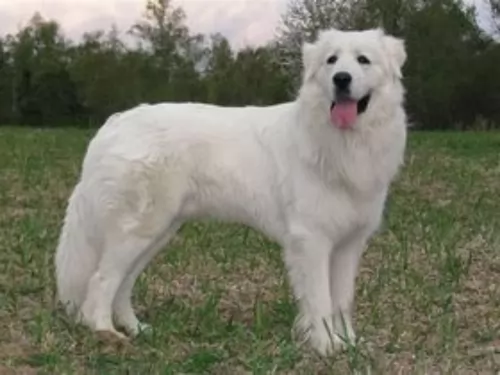 Your playful Slovak Cuvac is an affectionate dog, wanting nothing more than to be totally involved in his family’s life.
Your playful Slovak Cuvac is an affectionate dog, wanting nothing more than to be totally involved in his family’s life.
He is social and loving and also makes an excellent watchdog. He’s a big dog so think carefully before you bring him into your home. Many dog owners like the look of a big dog and forget that it costs a lot of money to feed a big dog and to pay for vet fees.
This big dog is wanting to be part of your family and not just to be discarded when you find that he is costing you too much.
 The Argentine Dogo can live to be between 10 and 12 years of age if he is looked after well, however about 10% of Argentine Dogos suffer from pigment-related deafness in one or both ears.
The Argentine Dogo can live to be between 10 and 12 years of age if he is looked after well, however about 10% of Argentine Dogos suffer from pigment-related deafness in one or both ears.
A dog can lose it’s hearing because of an ear infection. That is why it is so important to watch your pets ears and make sure that the ears aren’t red and that your pet isn't continually scratching his ears.
The most common cause of congenital deafness with a dog is pigment-related. Dogs with white coats are often affected by deafness and you commonly see deafness in dogs with white pigmented skin because they carry the piebald gene – the white coat and often blue eyes. Without a particular stem cell, the white dog’s body isn’t able to make a special layer of hearing cells.
There is a high rate of hip dysplasia with these dogs and more than 40% of Argentine Dogos have malformed hips. This isn’t a dog ailment to take lightly as it can lead to pain, discomfort and even lameness for your pet.
Skin diseases such as red, itchy allergies are also common with these dogs as well as eye diseases.
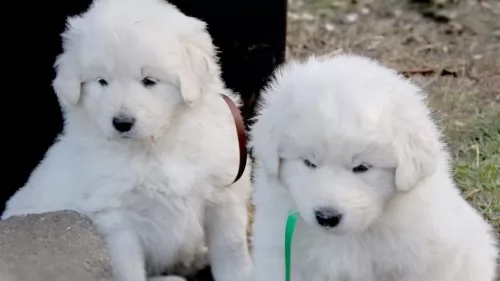 This is a healthy dog breed, but as with many large dogs, hip dysplasia is a threat. Hip dysplasia is always reason for concern as the condition can reduce a dog’s quality of life.
This is a healthy dog breed, but as with many large dogs, hip dysplasia is a threat. Hip dysplasia is always reason for concern as the condition can reduce a dog’s quality of life.
It is distressing seeing your once active pet becoming reluctant to play and move around.
Canine hip dysplasia is a common skeletal condition. It can strike any size dog but is more prevalent with large dogs. The ball and socket of the hip doesn’t fit properly and deterioration sets in resulting in loss of function of the joint.
You will need to get your dog to the vet who will perform a physical exam and discuss treatments to alleviate the pain your dog can experience.
 With his short coat, the Argentine Dogo is a low maintenance dog, requiring a good brush twice a week. Its a pure white dog, and wiping him down with a damp cloth can keep his coat looking dazzling white and clean.
With his short coat, the Argentine Dogo is a low maintenance dog, requiring a good brush twice a week. Its a pure white dog, and wiping him down with a damp cloth can keep his coat looking dazzling white and clean.
Grooming your dog like this gives you a good chance to also check your pet for fleas and ticks and to ensure the skin is free from infection or dryness. You will find that he sheds a bit more in the hotter seasons, but during the colder months it will be wise to bring your pet indoors.
Other areas to consistently check with your dog are his nails – to keep them trimmed, to clean his teeth 2 or 3 times a week with proper canine toothbrush and toothpaste and to check his ears for infection.
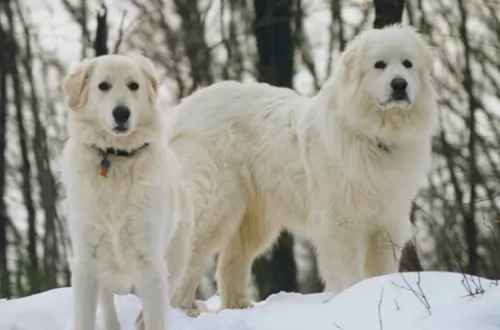 ◆The thick white hair will require regular grooming to keep it free from burrs and dirt. He sheds so this brushing will help him to look more groomed.
◆The thick white hair will require regular grooming to keep it free from burrs and dirt. He sheds so this brushing will help him to look more groomed.
◆The nails should be trimmed regularly and the ears too should be checked for redness and infection. You’ll need to look inside his mouth too as a rotting tooth can cause havoc within his body. A rotten tooth can also cause him tremendous pain and he has no way of telling you this.
◆Have your pet spayed or neutered if you don’t want any puppies. This is better for your dog’s health in the long run too.
◆Your Slovak Cuvac is going to need a lot of exercise as they have always been used to roaming the mountains watching over livestock.
◆This is a big dog so if you buy commercially manufactured food, make sure its for large, energetic dogs. There are good commercially manufactured dog foods on the market – just make sure you buy the best one for your pet to enhance health and longevity.
Try and give him some home made food too. Healthy food which won’t jeopardise his digestion is boiled chicken, brown rice or pasta and spinach, sweet potatoes and carrots. These can all be chopped up and small portions mixed into the dry kibble twice a week as a treat.
Try and include some raw meat occasionally. Your dog will thank you for not giving him exotic people foods which can do lots of harm. Ensure there is always a bowl of fresh, cool water within his reach.